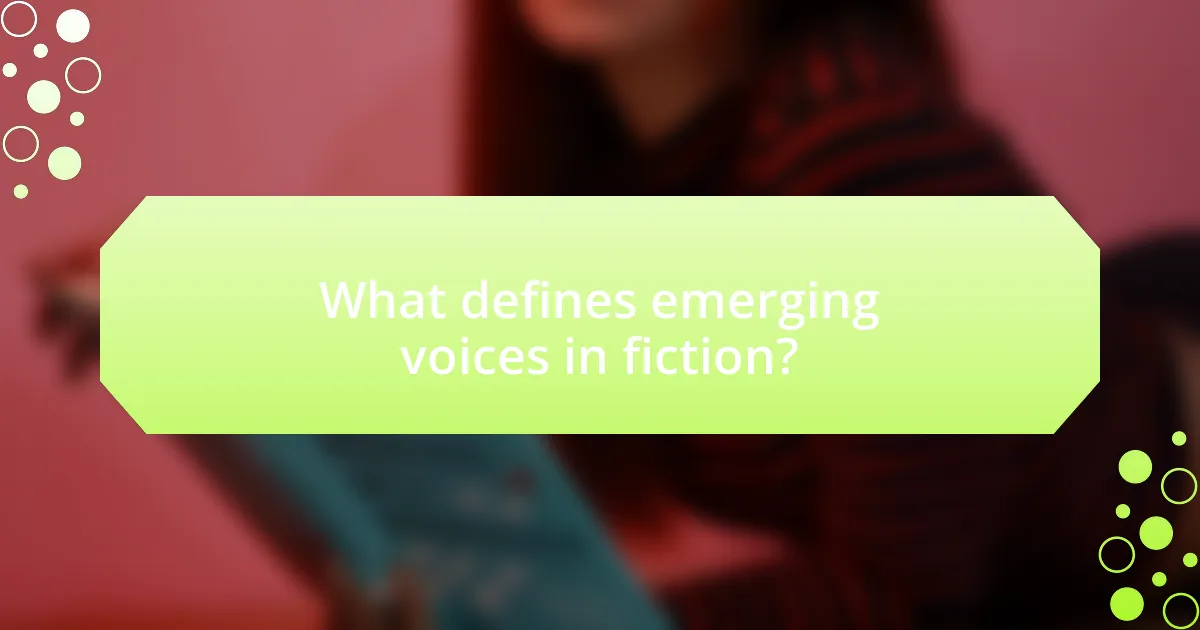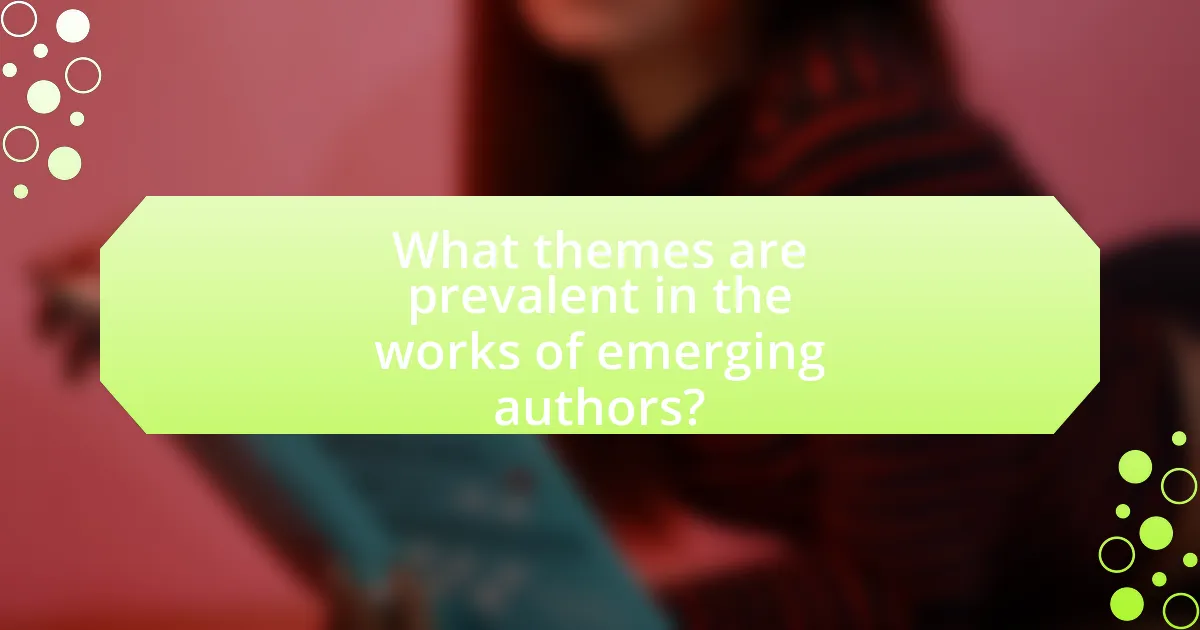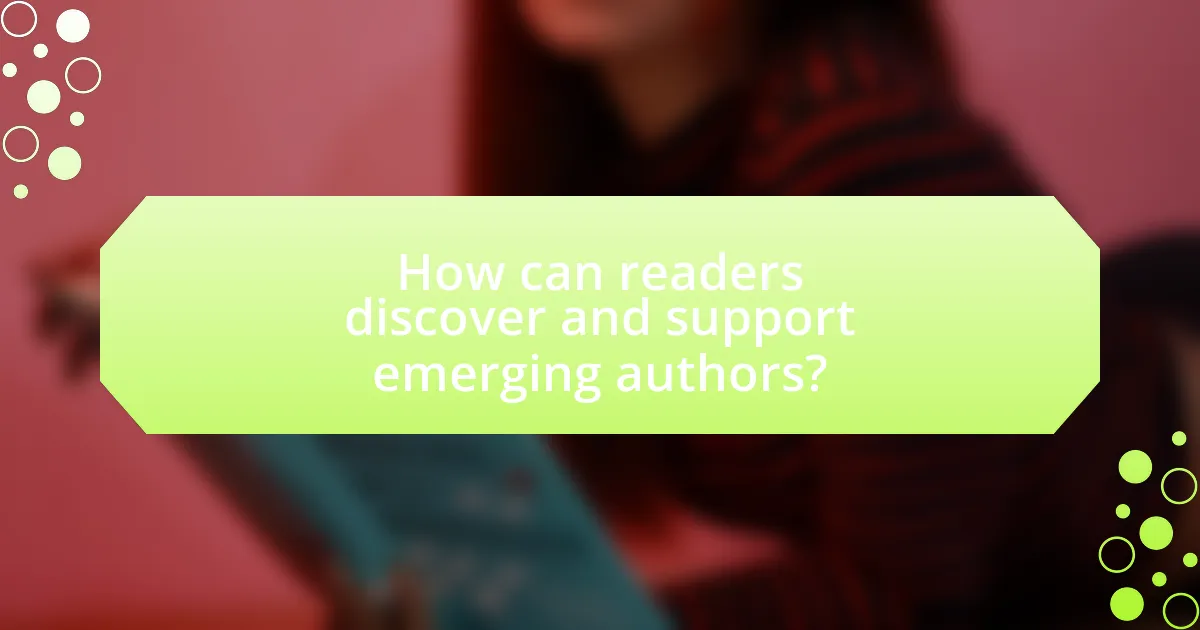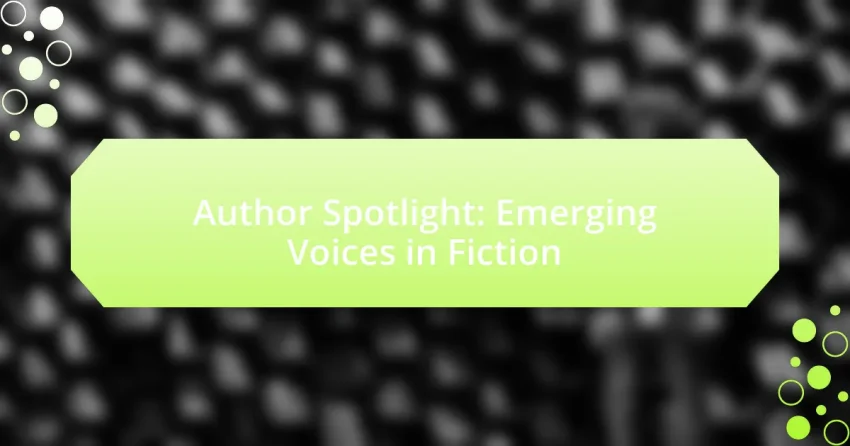The article “Author Spotlight: Emerging Voices in Fiction” examines the characteristics and significance of new authors in the literary landscape. It defines emerging voices by their unique perspectives and innovative storytelling that address contemporary social issues, highlighting authors like Ocean Vuong and Yaa Gyasi. The article outlines how emerging authors are identified, the criteria for classification, and the support they receive from the publishing industry. It emphasizes the importance of spotlighting these voices for fostering diversity and innovation in literature, while also discussing prevalent themes and genres explored by new authors. Additionally, it provides insights on how readers can discover and support emerging talent through various platforms and community engagement.

What defines emerging voices in fiction?
Emerging voices in fiction are defined by their unique perspectives, innovative storytelling techniques, and the ability to address contemporary social issues. These authors often come from diverse backgrounds, bringing fresh narratives that challenge traditional literary norms. For instance, the rise of authors like Ocean Vuong and Yaa Gyasi illustrates how new voices can reshape the literary landscape by incorporating personal experiences and cultural heritage into their work. Their contributions not only reflect the complexities of modern society but also resonate with a broader audience, highlighting the importance of representation in literature.
How do we identify emerging authors in the literary landscape?
Emerging authors in the literary landscape are identified through a combination of factors including their participation in literary contests, presence in literary journals, and engagement on social media platforms. Literary contests such as the Pushcart Prize or the O. Henry Award often spotlight new talent, while literary journals like The New Yorker or Granta frequently publish works by emerging writers, providing them visibility. Additionally, social media platforms allow authors to build a following and showcase their work, making it easier for publishers and readers to discover new voices. This multi-faceted approach ensures that emerging authors gain recognition and can establish themselves within the literary community.
What criteria are used to classify an author as ’emerging’?
An author is classified as ’emerging’ based on several criteria, including the lack of a significant publishing history, recent publication of their first or second book, and recognition through awards or nominations in literary circles. Emerging authors typically have not yet achieved widespread commercial success or critical acclaim, which distinguishes them from established authors. For instance, the Emerging Writer Fellowship awarded by the PEN America organization highlights authors who are in the early stages of their careers, further validating the criteria used for classification.
How does the publishing industry support new voices?
The publishing industry supports new voices through initiatives such as mentorship programs, diverse publishing imprints, and grants specifically aimed at emerging authors. These programs provide guidance, resources, and financial assistance to help new writers navigate the complexities of publishing. For example, organizations like the We Need Diverse Books initiative advocate for underrepresented voices and offer grants to authors from marginalized backgrounds, thereby fostering a more inclusive literary landscape. Additionally, many publishing houses have established dedicated imprints that focus on debut authors, ensuring that fresh perspectives are brought to the forefront of the industry.
Why is it important to spotlight emerging voices in fiction?
Spotlighting emerging voices in fiction is crucial for fostering diversity and innovation in literature. These voices often bring fresh perspectives and unique experiences that challenge the status quo, enriching the literary landscape. For instance, a study by the National Endowment for the Arts found that diverse narratives can enhance empathy and understanding among readers, promoting cultural awareness. By highlighting these authors, the literary community not only supports underrepresented groups but also encourages a broader range of storytelling that reflects the complexities of contemporary society.
What impact do new authors have on literary diversity?
New authors significantly enhance literary diversity by introducing unique perspectives, cultural narratives, and innovative storytelling techniques. Their fresh voices often reflect underrepresented communities and experiences, which broadens the scope of literature available to readers. For instance, according to a 2021 study by the Cooperative Children’s Book Center, only 27% of children’s books published featured characters of color, highlighting the need for diverse authors to fill this gap. By contributing their distinct backgrounds and viewpoints, new authors challenge the dominant narratives and foster a richer literary landscape.
How do emerging voices challenge traditional narratives?
Emerging voices challenge traditional narratives by introducing diverse perspectives and experiences that often contradict established norms. These new authors frequently draw from their unique cultural backgrounds, personal histories, and contemporary social issues, which allows them to question and reinterpret dominant narratives. For instance, authors like Ocean Vuong and Chimamanda Ngozi Adichie have reshaped literary discourse by highlighting themes of identity, migration, and intersectionality, thereby expanding the scope of storytelling beyond conventional boundaries. Their works not only reflect the complexities of modern life but also encourage readers to reconsider preconceived notions, ultimately fostering a more inclusive literary landscape.

What themes are prevalent in the works of emerging authors?
Emerging authors frequently explore themes of identity, social justice, and mental health. These themes reflect contemporary societal issues and personal experiences, allowing new voices to resonate with diverse audiences. For instance, many emerging writers delve into the complexities of cultural identity, often drawing from their own backgrounds to highlight the struggles and triumphs of navigating multiple cultures. Additionally, social justice themes are prevalent, as authors address systemic inequalities and advocate for marginalized communities. Mental health is another significant theme, with narratives that explore personal struggles and societal perceptions, fostering empathy and understanding. These thematic choices are supported by the increasing visibility of diverse voices in literature, as evidenced by the rise of literary awards recognizing underrepresented authors.
How do emerging voices reflect contemporary societal issues?
Emerging voices reflect contemporary societal issues by providing fresh perspectives that challenge existing narratives and highlight underrepresented experiences. These authors often address themes such as social justice, identity, and inequality, resonating with current movements like Black Lives Matter and climate activism. For instance, novels by authors like Ocean Vuong and Angie Thomas explore the complexities of race and identity in modern America, illustrating the struggles faced by marginalized communities. Their works not only engage readers but also spark conversations about pressing societal challenges, thereby influencing public discourse and awareness.
What specific themes resonate with today’s readers?
Today’s readers resonate with themes of identity, social justice, mental health, and environmental sustainability. These themes reflect contemporary societal issues and personal experiences that are increasingly relevant. For instance, a 2021 survey by the Pew Research Center found that 70% of readers are drawn to stories that explore diverse identities and experiences, highlighting the importance of representation in literature. Additionally, the rise of discussions around mental health has led to a growing interest in narratives that address emotional struggles, with 60% of readers expressing a preference for books that tackle these topics. Furthermore, environmental themes have gained traction, as evidenced by the popularity of eco-fiction, which reflects a collective concern for climate change and sustainability.
How do these themes differ from established authors?
Emerging voices in fiction often explore themes that diverge from those of established authors by focusing on contemporary social issues, diverse perspectives, and innovative narrative structures. For instance, while established authors may adhere to traditional storytelling methods and themes rooted in classic literature, emerging writers frequently challenge these conventions by incorporating elements such as intersectionality, technology’s impact on society, and global cultural influences. This shift reflects a broader societal change, as seen in the rise of authors like Ocean Vuong and Yaa Gyasi, who address themes of identity and belonging in ways that resonate with modern audiences. Their works often highlight underrepresented voices and experiences, contrasting with the more homogeneous themes typically found in the canon of established literature.
What genres are being explored by new authors?
New authors are exploring genres such as speculative fiction, contemporary romance, and psychological thrillers. Speculative fiction, which includes sub-genres like science fiction and fantasy, allows new voices to challenge societal norms and imagine alternative realities. Contemporary romance is gaining traction as it reflects modern relationships and diverse experiences, appealing to a broad audience. Psychological thrillers are also popular, as they delve into the complexities of the human mind and societal issues, often featuring unreliable narrators and intricate plots. These genres are being embraced by new authors to engage readers with fresh perspectives and innovative storytelling techniques.
Which genres are gaining popularity among emerging voices?
Genres gaining popularity among emerging voices include speculative fiction, contemporary romance, and diverse narratives. Speculative fiction, which encompasses elements of fantasy and science fiction, is increasingly appealing due to its ability to explore complex societal issues and imaginative worlds. Contemporary romance has seen a rise as new authors bring fresh perspectives and inclusivity to traditional tropes. Additionally, diverse narratives that reflect a wide range of cultural experiences are gaining traction, as readers seek authenticity and representation in storytelling. This trend is supported by data from publishing industry reports indicating a significant increase in titles within these genres, reflecting changing reader preferences and the growing demand for varied voices in literature.
How do genre-blending techniques enhance storytelling?
Genre-blending techniques enhance storytelling by allowing authors to combine elements from different genres, creating richer narratives and broader emotional experiences. This approach enables writers to break traditional boundaries, engaging diverse audiences and fostering innovative plot developments. For instance, the fusion of science fiction and romance can introduce complex character dynamics while exploring futuristic themes, as seen in works like “The Time Traveler’s Wife” by Audrey Niffenegger. Such blending not only captivates readers but also encourages them to think critically about genre conventions and their implications, ultimately leading to a more immersive reading experience.

How can readers discover and support emerging authors?
Readers can discover and support emerging authors by exploring independent bookstores, online platforms, and literary events. Independent bookstores often feature local authors and host book signings, providing direct access to new voices. Online platforms like Wattpad and Goodreads allow readers to find self-published works and engage with authors through reviews and discussions. Additionally, attending literary festivals and author readings fosters community support and awareness of emerging talent. Supporting these authors through purchases, reviews, and social media engagement can significantly impact their visibility and success in the literary market.
What platforms are available for discovering new voices in fiction?
Platforms available for discovering new voices in fiction include Wattpad, Scribophile, and Medium. Wattpad allows writers to share their stories and connect with readers, boasting over 90 million users and a vast library of user-generated content. Scribophile focuses on critique and feedback, enabling writers to improve their work through community engagement. Medium offers a platform for writers to publish articles and stories, reaching a diverse audience and fostering new talent. These platforms collectively provide opportunities for emerging authors to showcase their work and gain visibility in the literary community.
How do social media and online communities facilitate this discovery?
Social media and online communities facilitate the discovery of emerging voices in fiction by providing platforms for authors to share their work and connect with readers. These platforms enable authors to showcase their writing through posts, threads, and shared content, allowing them to reach a wider audience than traditional publishing methods. For instance, platforms like Twitter and Instagram have dedicated hashtags such as #amwriting and #bookcommunity, which help authors gain visibility and engage with potential readers. Additionally, online communities, such as Goodreads and various writing forums, allow users to discuss and recommend new authors, further amplifying their reach. According to a 2021 survey by the Pew Research Center, 69% of adults in the U.S. use social media, indicating a vast audience for authors to tap into for discovery and engagement.
What role do literary festivals play in promoting emerging authors?
Literary festivals play a crucial role in promoting emerging authors by providing them with a platform to showcase their work and connect with audiences. These events often feature panels, readings, and workshops that allow new writers to gain visibility and engage with established authors, publishers, and literary agents. For instance, the Edinburgh International Book Festival has been known to spotlight debut authors, helping them reach wider audiences and facilitating networking opportunities that can lead to publishing deals. Additionally, literary festivals often include awards and competitions specifically for emerging voices, further enhancing their recognition in the literary community.
What are some effective ways to support emerging authors?
Effective ways to support emerging authors include providing mentorship, facilitating access to publishing resources, and promoting their work through social media and literary events. Mentorship programs connect experienced authors with newcomers, offering guidance on writing, editing, and navigating the publishing landscape. Access to publishing resources, such as workshops and grants, can help emerging authors refine their craft and gain visibility. Additionally, promoting their work through social media platforms and local literary events can significantly increase their audience reach, as studies show that authors with active online presences tend to sell more books and engage better with readers.
How can readers engage with authors through book clubs and events?
Readers can engage with authors through book clubs and events by participating in discussions, asking questions, and providing feedback directly to the authors. Book clubs often host author visits, either in-person or virtually, allowing readers to interact with the authors about their works, themes, and writing processes. Events such as book signings, readings, and literary festivals also create opportunities for readers to connect with authors, fostering a sense of community and shared interest in literature. According to a study by the American Library Association, 70% of readers reported that attending author events enhanced their reading experience, demonstrating the value of direct engagement with authors.
What impact does purchasing and reviewing books have on new authors?
Purchasing and reviewing books significantly impact new authors by enhancing their visibility and credibility in the literary market. When readers buy and review a new author’s work, it increases the book’s ranking on platforms like Amazon and Goodreads, which can lead to greater exposure and sales. For instance, a study by the Authors Guild found that books with more reviews tend to sell better, as positive reviews build trust among potential readers. Additionally, reviews can provide valuable feedback for authors, helping them improve their craft and understand their audience better. Thus, purchasing and reviewing books are crucial for new authors to establish their presence and succeed in a competitive industry.
